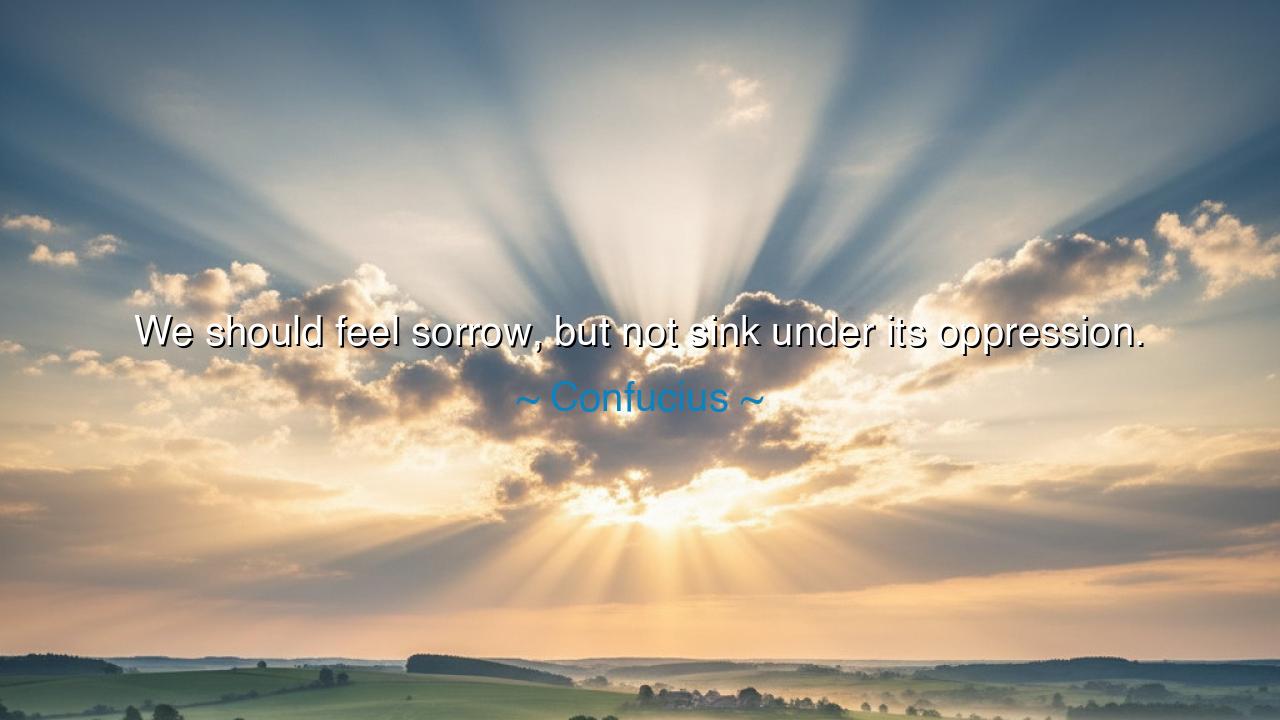
We should feel sorrow, but not sink under its oppression.






Confucius, the great sage of the East and teacher of harmony, once spoke with timeless wisdom: “We should feel sorrow, but not sink under its oppression.” In this counsel he does not command us to banish grief, nor to harden our hearts against loss, but to walk the narrow path between numbness and despair. To feel sorrow is to be human, to honor the bonds of love and the weight of loss; yet to let that sorrow crush us is to surrender the gift of life itself.
The ancients of many lands echoed this truth. The Stoics of Greece and Rome, though often thought of as cold, did not deny grief but taught moderation. Seneca himself wrote that tears are natural, but must not become floods that drown the soul. In the same spirit, Confucius teaches balance: to grieve is proper, but to be broken entirely by grief is to fail in one’s duty to the living, to family, to community, and to self. Sorrow must be felt, but not enthroned as master.
History offers many mirrors of this wisdom. Consider Queen Elizabeth I of England. When her beloved Robert Dudley died, she fell into deep sorrow, closing herself away and refusing food. Yet after time, she rose again to rule, for she knew her people could not afford a monarch paralyzed by grief. Her tears were real, but she did not sink under their oppression. By lifting herself, she gave strength to her nation, showing that sorrow could coexist with duty.
Confucius’ own life was touched by grief. He lost his son, and yet he continued his teaching, guiding disciples with wisdom forged in the fire of loss. For him, sorrow was not weakness but a sign of humanity, a thread binding one life to another. Yet he also knew that if grief becomes too heavy, it blinds the mind, bends the spirit, and makes a man unfit for the responsibilities he still carries. Thus, his teaching is compassionate but stern: honor your grief, but do not let it unmake you.
This teaching is as vital today as it was in the halls of ancient China. How many in our age hide their grief, fearing it a sign of weakness? How many, by contrast, are consumed by it, unable to move forward? Confucius offers a path between these extremes: acknowledgment without annihilation, mourning without despair. Sorrow is a guest that must be welcomed, but not allowed to rule the household of the heart.
The practical action is this: when grief comes, do not deny it — speak it, share it, weep it. But also give yourself the command to rise again. Build rituals that honor the dead, but also rituals that honor the living. Surround yourself with those who can carry you when your strength fails, and carry others when theirs falters. Remember that grief may bend the tree, but it need not break it. By choosing not to sink under oppression, you transform grief into resilience.
So remember, O seekers of wisdom: Confucius does not ask you to flee sorrow, but to stand upright within it. Feel it, for it proves you have loved. Endure it, for it proves you have strength. Rise above it, for it proves you still have purpose. Let grief refine you, but never let it enslave you. In this way, you will honor both the ones you have lost and the life that still beats within you — steady, fragile, yet unbroken.






AAdministratorAdministrator
Welcome, honored guests. Please leave a comment, we will respond soon